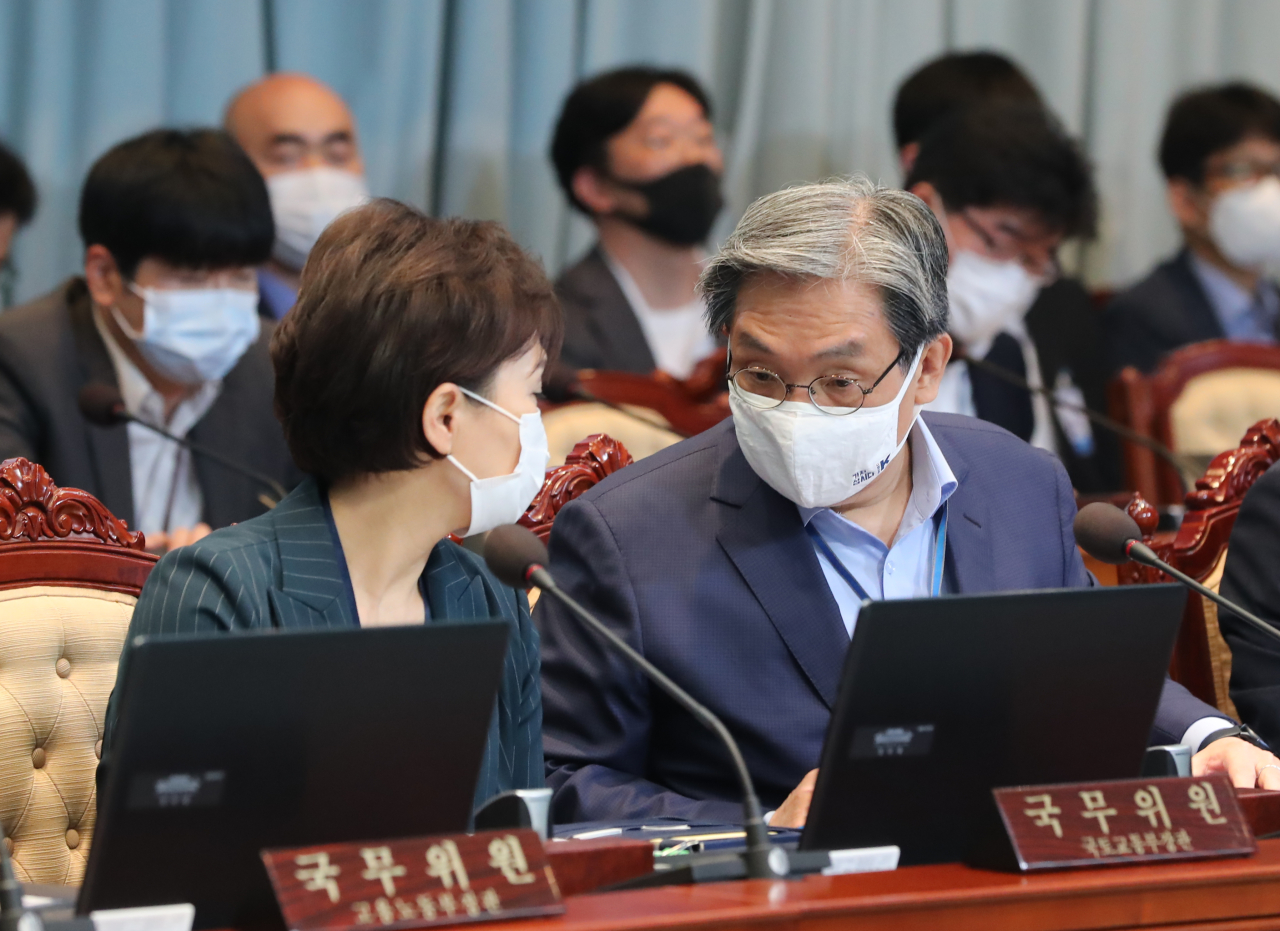[Newsmaker] Controversy over multiple homeownership grips government, ruling party
By Choi He-sukPublished : July 8, 2020 - 16:31

The government and ruling Dmocratic Party of Korea are taking unprecedented steps to douse the controversy over multiple homeownership among their ranks faced with mounting criticism from both conservative and progressive blocs.
On Wednesday, Noh Young-min, President Moon Jae-in’s chief of staff, announced that he will sell his southern Seoul home within the month, saying that he has failed to meet public expectations.
Noh’s Seoul home became a focal point in the growing controversy for two reasons. One is that it while owning two properties, he instructed multiple homeowners among ranking Cheong Wa Dae staff to sell properties and leave just one in their possession. The second is that he chose to sell the comparatively cheaper property in Cheongju, North Chungcheong Province, while maintaining ownership of the property in southern Seoul – the epicenter of the massive real estate price rise.
Noh’s decision drew fire from all corners, even from the Justice Party -- a long time off-and-on ally of the Democratic Party -- and progressive NGOs.
At a party meeting on Tuesday, Justice Party leader Rep. Sim Sang-jeung criticized Noh, saying that the message sent by his actions is stronger than that of the administration’s real estate policies.
And on Wednesday, Noh announced the decision to sell his Seoul home in a Facebook post. In the post, Noh said that he had chosen to sell the Cheongju property as it had remained unoccupied for several years, while the Seoul home is occupied by his family.
“However, selling the Cheongju apartment was seen as an attempt to keep the Seoul apartment, falling short of the public’s expectations,” Noh said.
“The apartment in Seoul will be sold within this month, as soon as my family’s residence is arranged. I will take this as an opportunity to look back at myself, and to treat (myself) more strictly.”
Noh’s initial decision to keep the Seoul property had raised concerns within the ruling party, and Rep. Lee Nak-yon -- former prime minister and now a party chairmanship contender -- reportedly advised Noh to sell the Seoul home.
The controversy that started with Cheong Wa Dae officials has spilled across the government. Prime Minister Chung Sye-kyun on Wednesday called on government ministries to look into homeownership status among ranking officials in the central and local governments, and to take steps to sell their multiple homes.
“The public opinion is very bad over real estate issues, and the government is focusing on development measures, but if high-level officials have several homes, no policy will win the people’s trust,” Chung said.
“The times call for high-level officials to set an example, but I feel that that time has been missed.”
The ruling party is also taking unprecedented steps in an attempt to address the issue. It has requested all of its lawmakers to submit real estate contracts -- regardless of ownership status.
Of the party’s 176 lawmakers, 42 are multiple homeowners, 21 of whom would be required to sell at least one property if the party is to keep its general elections pledge.
In the run-up to the April 15 general elections, the party pledged that its candidates with more than one property in areas subject to anti-speculation measures will sell their properties.
By Choi He-suk (cheesuk@heraldcorp.com)








![[Graphic News] More Koreans say they plan long-distance trips this year](http://res.heraldm.com/phpwas/restmb_idxmake.php?idx=644&simg=/content/image/2024/04/17/20240417050828_0.gif&u=)
![[KH Explains] Hyundai's full hybrid edge to pay off amid slow transition to pure EVs](http://res.heraldm.com/phpwas/restmb_idxmake.php?idx=644&simg=/content/image/2024/04/18/20240418050645_0.jpg&u=20240419100350)






![[From the Scene] Monks, Buddhists hail return of remains of Buddhas](http://res.heraldm.com/phpwas/restmb_idxmake.php?idx=652&simg=/content/image/2024/04/19/20240419050617_0.jpg&u=20240419175937)

![[KH Explains] Hyundai's full hybrid edge to pay off amid slow transition to pure EVs](http://res.heraldm.com/phpwas/restmb_idxmake.php?idx=652&simg=/content/image/2024/04/18/20240418050645_0.jpg&u=20240419100350)

![[Today’s K-pop] Illit drops debut single remix](http://res.heraldm.com/phpwas/restmb_idxmake.php?idx=642&simg=/content/image/2024/04/19/20240419050612_0.jpg&u=)